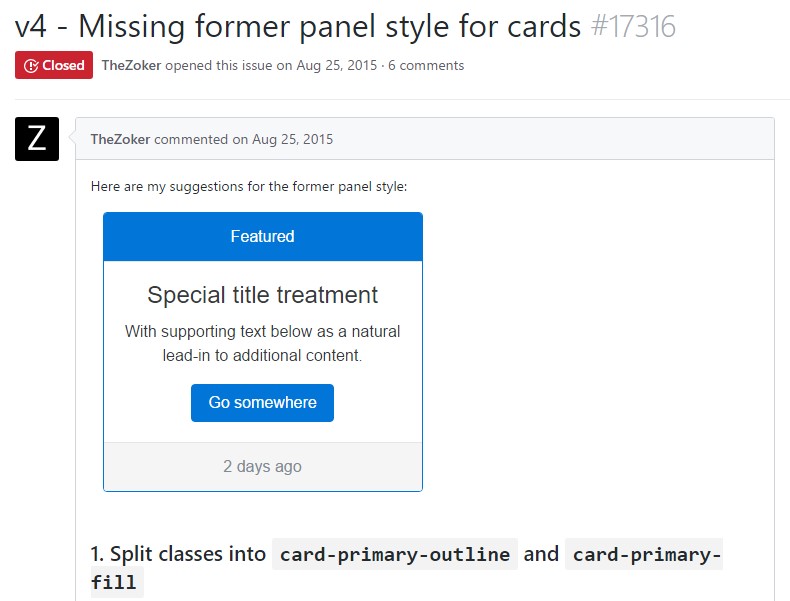Bootstrap Panel Default
Introduction
Frequently we should split up several short (or not so much) components of content to make them stand up and get the person's attention-- such as noting several useful features showing a listing of articles along with a short extract and a solitary powerful picture and so on and on.
Thus we need a beneficial tool to nicely cover our content in a stunning and flexible manner to have it pleasant and neat presented on our pages. In the recent version of the most trendy flexible framework-- Bootstrap 3 we employed mostly the Bootstrap Panel Border, thumbnail and well elements giving us box containers having a slight border, quite elliptical corners and finally-- a slight 3d impact. In the latest Bootstrap 4 framework, these are no longer. They get got changed collectively by the card piece stating to be capable of basically whatever the ancestors can do but only improved. So it's time to get to know it more.
Strategies to utilize the Bootstrap Panel Button:
The cards are lightly styled boxes capable of holding almost any HTML content in them in addition featuring a many predefined styling option for properly showing its article. It in addition optionally can have a footer and a header.
Inside the .card-block element you can have a headline carrying the class .card-title which may be assigned to theh1-- h6 headings in addition to a regular <div> and fo course -- come text wrapped in a section with the .card-text class. If you make a decision to place some links along-- assign them the .card-link class to get them certainly differentiated for greater user interaction.
The contextual color classes may be employed to additionally style your entire card pieces quickly-- simply add a .card- ~ one of the contextual colors here like primary, success, info or danger here ~ to the main .card wrapper and if the background becomes a bit overly dark for the text to be legible enough-- also add the .card-inverse class to invert the text color. You can also style only the line color employing the contextual palette-- this gets done by adding the .card-outline- ~ the needed colour ~ class again to the major .card element.
As discussed before the .card-block arrives to cover the content leaving a pretty padding around it. When it comes to images this might want to avoid this and have the image stretched the whole width of the component.
To receive this look simply put the <div class="img"><img></div> tag outside the .card-block so you avoid the paddings eventually including style=" width:100%;" to make sure this will resize correctly always filling in its container.
A few words regarding the layout-- cards will fill the complete horizontal space available by default so it's a great idea controling it by placing them in some grid elements. By doing this you can obtain their predictable actions.
Some example
Cards are built with as little markup and styles as possible, but still operate to offer a plenty of regulation and modification. Built using flexbox, they offer easy positioning and combine properly with other Bootstrap elements.
Below is an illustration of a basic card with blended content and a fixed width. Cards have no fixed width to start, so they'll naturally fill the full width of its parent element. This is conveniently modified with a variety of sizing alternatives.
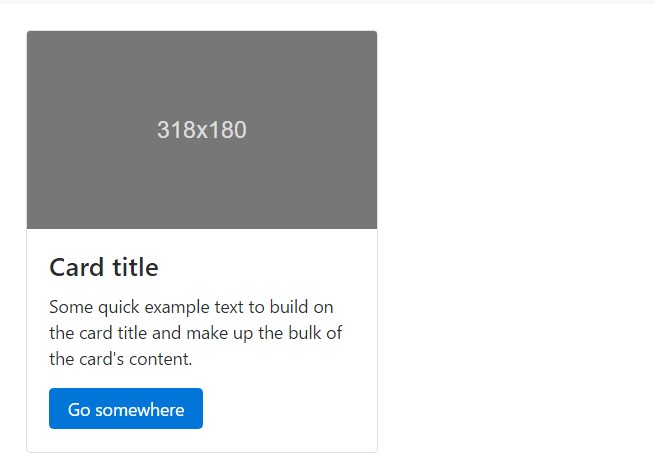
<div class="card" style="width: 20rem;">
<div class="img"><img class="card-img-top" src="..." alt="Card picture caption"></div>
<div class="card-block">
<h4 class="card-title">Card caption</h4>
<p class="card-text">Some fast sample message to build on the card title as well as compose the bulk of the card's material.</p>
<a href="#" class="btn btn-primary">Go somewhere</a>
</div>
</div>Web information sorts
Cards support a large range of content, involving pics, text, list collections, urls, and more. Below are illustrations of what's maintained.
Blocks
The building block of a card is the .card-block. Use it whenever you require a padded section within a card.

<div class="card">
<div class="card-block">
This is some message in a card block.
</div>
</div>Titles, message, and hyperlinks

<div class="card">
<div class="card-block">
<h4 class="card-title">Card title</h4>
<h6 class="card-subtitle mb-2 text-muted">Card subtitle</h6>
<p class="card-text">Some fast example message to improve the card title and compose the mass of the card's content.</p>
<a href="#" class="card-link">Card link</a>
<a href="#" class="card-link">Another link</a>
</div>
</div>Images
.card-img-top spots a pic to the very top of the card. With .card-text, text can be added to the card. Text within .card-text may also be styled with the standard HTML tags.
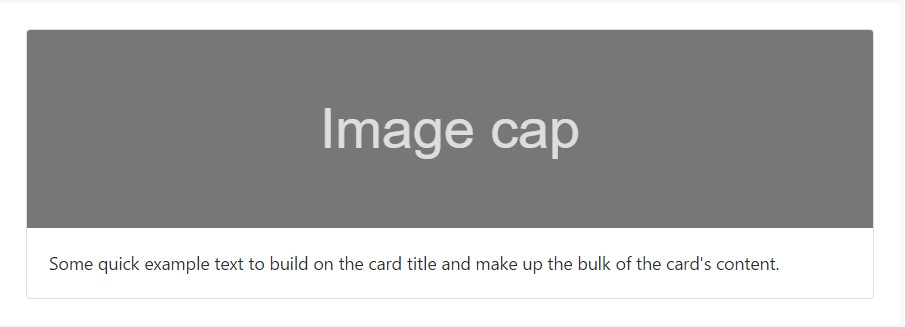
<div class="card">
<div class="img"><img class="card-img-top" src="..." alt="Card picture cap"></div>
<div class="card-block">
<p class="card-text">Some fast example message to build on the card title and also compose the bulk of the card's web content.</p>
</div>
</div>Selection groups
Make lists of content in a card using a flush list group.

<div class="card">
<ul class="list-group list-group-flush">
<li class="list-group-item">Cras justo odio</li>
<li class="list-group-item">Dapibus ac facilisis in</li>
<li class="list-group-item">Vestibulum at eros</li>
</ul>
</div>Mix and go with different material sorts to produce the card you desire, or throw everything in there.Displayed here are picture layouts, blocks, notification designs, plus a list group - all wrapped in a fixed-width card.

<div class="card" style="width: 20rem;">
<div class="img"><img class="card-img-top" src="..." alt="Card image cap"></div>
<div class="card-block">
<h4 class="card-title">Card title</h4>
<p class="card-text">Some quick example text to build on the card title and make up the bulk of the card's content.</p>
</div>
<ul class="list-group list-group-flush">
<li class="list-group-item">Cras justo odio</li>
<li class="list-group-item">Dapibus ac facilisis in</li>
<li class="list-group-item">Vestibulum at eros</li>
</ul>
<div class="card-block">
<a href="#" class="card-link">Card link</a>
<a href="#" class="card-link">Another link</a>
</div>
</div>Header and footer
Include an optional header and/or footer inside a card.

<div class="card">
<div class="card-header">
Featured
</div>
<div class="card-block">
<h4 class="card-title">Unique title therapy</h4>
<p class="card-text">With supporting message below as an all-natural lead-in to extra content.</p>
<a href="#" class="btn btn-primary">Go someplace</a>
</div>
</div>Card headers can be styled by including .card-header to <h*> sections.

<div class="card">
<h3 class="card-header">Featured</h3>
<div class="card-block">
<h4 class="card-title">Special title treatment</h4>
<p class="card-text">With supporting message below as a natural lead-in to extra content.</p>
<a href="#" class="btn btn-primary">Go someplace</a>
</div>
</div>
<div class="card">
<div class="card-header">
Quote
</div>
<div class="card-block">
<blockquote class="card-blockquote">
<p>Lorem ipsum dolor sit amet, consectetur adipiscing elit. Integer posuere erat a ante.</p>
<footer>Someone famous in <cite title="Source Title">Source Title</cite></footer>
</blockquote>
</div>
</div>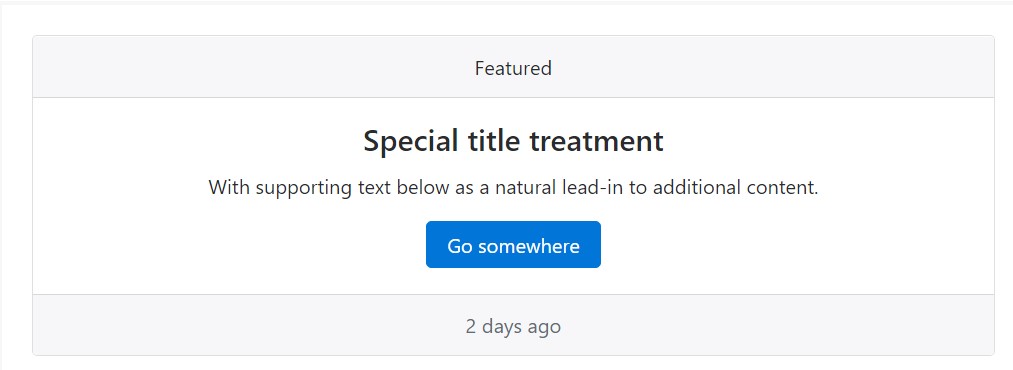
<div class="card text-center">
<div class="card-header">
Featured
</div>
<div class="card-block">
<h4 class="card-title">Special title treatment</h4>
<p class="card-text">With supporting text below as an all-natural lead-in to extra material.</p>
<a href="#" class="btn btn-primary">Go someplace</a>
</div>
<div class="card-footer text-muted">
2 days ago
</div>
</div>Proportions
Cards have no precise width to start, so they'll be 100% expanded except otherwise mentioned. You can modify this as desired with customized CSS, grid classes, grid Sass mixins, or utilities.
Operating grid markup
Using the grid, wrap cards in columns and rows as needed.

<div class="row">
<div class="col-sm-6">
<div class="card">
<div class="card-block">
<h3 class="card-title">Special title treatment</h3>
<p class="card-text">With supporting text below as a natural lead-in to additional content.</p>
<a href="#" class="btn btn-primary">Go somewhere</a>
</div>
</div>
</div>
<div class="col-sm-6">
<div class="card">
<div class="card-block">
<h3 class="card-title">Special title treatment</h3>
<p class="card-text">With supporting text below as a natural lead-in to additional content.</p>
<a href="#" class="btn btn-primary">Go somewhere</a>
</div>
</div>
</div>
</div>Making use of utilities
Use handful of offered sizing utilities to quickly establish a card's size.
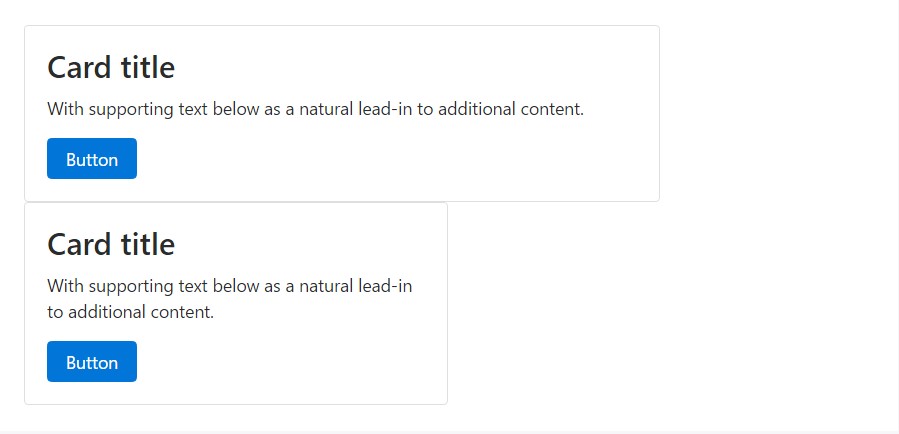
<div class="card w-75">
<div class="card-block">
<h3 class="card-title">Card title</h3>
<p class="card-text">With supporting text below as a natural lead-in to additional content.</p>
<a href="#" class="btn btn-primary">Button</a>
</div>
</div>
<div class="card w-50">
<div class="card-block">
<h3 class="card-title">Card title</h3>
<p class="card-text">With sustaining message listed below as an all-natural lead-in to extra web content.</p>
<a href="#" class="btn btn-primary">Button</a>
</div>
</div>
<div class="card" style="width: 20rem;">
<div class="card-block">
<h3 class="card-title">Special title treatment</h3>
<p class="card-text">With supporting text below as a natural lead-in to added material.</p>
<a href="#" class="btn btn-primary">Go somewhere</a>
</div>
</div>Information location
You could quickly transform the message placement of any type of card-- in its entirety or certain parts-- with text align classes.
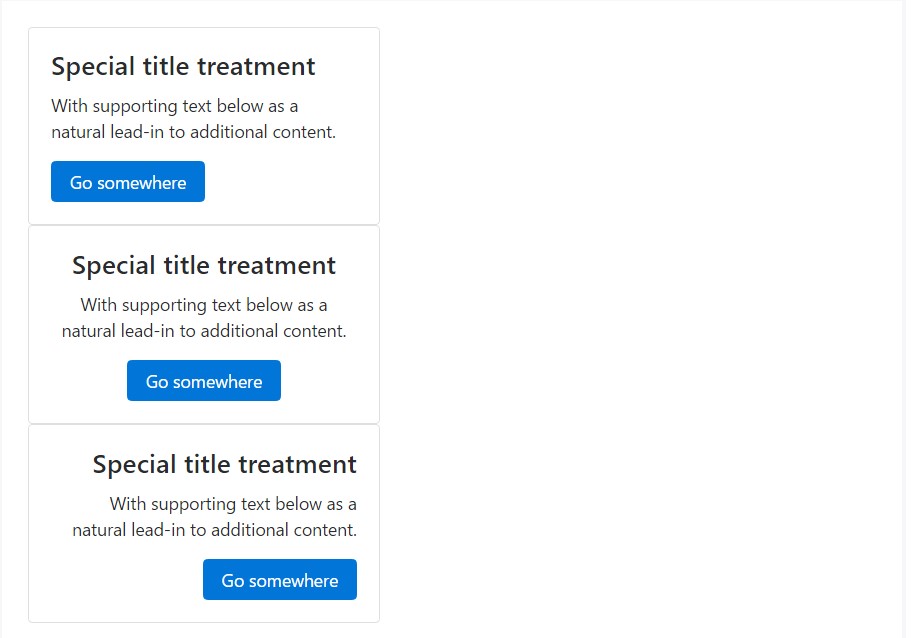
<div class="card" style="width: 20rem;">
<div class="card-block">
<h4 class="card-title">Special title treatment</h4>
<p class="card-text">With supporting text below as a natural lead-in to additional content.</p>
<a href="#" class="btn btn-primary">Go somewhere</a>
</div>
</div>
<div class="card text-center" style="width: 20rem;">
<div class="card-block">
<h4 class="card-title">Special title treatment</h4>
<p class="card-text">With supporting text below as a natural lead-in to additional content.</p>
<a href="#" class="btn btn-primary">Go somewhere</a>
</div>
</div>
<div class="card text-right" style="width: 20rem;">
<div class="card-block">
<h4 class="card-title">Special title treatment</h4>
<p class="card-text">With supporting text below as a natural lead-in to additional content.</p>
<a href="#" class="btn btn-primary">Go somewhere</a>
</div>
</div>Web site navigating
Put some navigation to a card's header (or block) with Bootstrap's nav elements.

<div class="card text-center">
<div class="card-header">
<ul class="nav nav-tabs card-header-tabs">
<li class="nav-item">
<a class="nav-link active" href="#">Active</a>
</li>
<li class="nav-item">
<a class="nav-link" href="#">Link</a>
</li>
<li class="nav-item">
<a class="nav-link disabled" href="#">Disabled</a>
</li>
</ul>
</div>
<div class="card-block">
<h4 class="card-title">Special title treatment</h4>
<p class="card-text">With supporting text below as a natural lead-in to additional content.</p>
<a href="#" class="btn btn-primary">Go somewhere</a>
</div>
</div>
<div class="card text-center">
<div class="card-header">
<ul class="nav nav-pills card-header-pills">
<li class="nav-item">
<a class="nav-link active" href="#">Active</a>
</li>
<li class="nav-item">
<a class="nav-link" href="#">Link</a>
</li>
<li class="nav-item">
<a class="nav-link disabled" href="#">Disabled</a>
</li>
</ul>
</div>
<div class="card-block">
<h4 class="card-title">Special title treatment</h4>
<p class="card-text">With supporting text below as a natural lead-in to additional content.</p>
<a href="#" class="btn btn-primary">Go somewhere</a>
</div>
</div>Images
Cards offer a few features for operating using pictures. Pick from appending "image caps" at possibly end of a card, covering images with card content, or just inserting the image in a card.
Image caps
Just like headers and footers, cards may feature bottom and top "image caps"-- pictures at the top or bottom of a card.
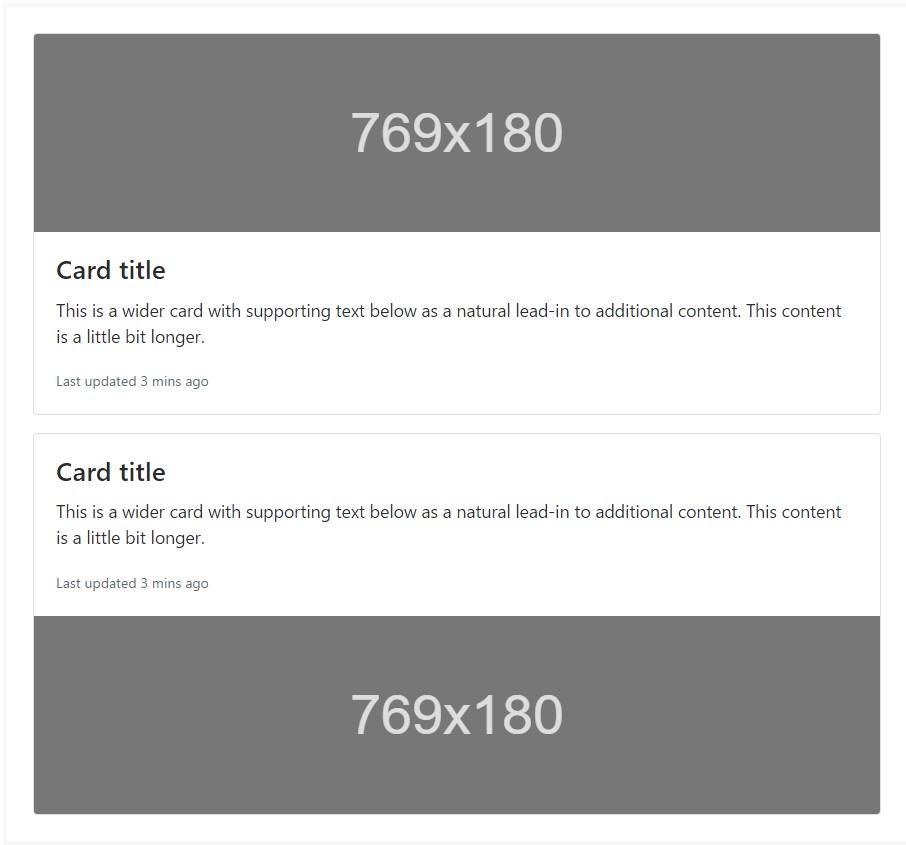
<div class="card mb-3">
<div class="img"><img class="card-img-top" src="..." alt="Card image cap"></div>
<div class="card-block">
<h4 class="card-title">Card title</h4>
<p class="card-text">This is a wider card with supporting text below as a natural lead-in to additional content. This content is a little bit longer.</p>
<p class="card-text"><small class="text-muted">Last updated 3 mins ago</small></p>
</div>
</div>
<div class="card">
<div class="card-block">
<h4 class="card-title">Card title</h4>
<p class="card-text">This is a wider card with supporting text below as a natural lead-in to additional content. This content is a little bit longer.</p>
<p class="card-text"><small class="text-muted">Last updated 3 mins ago</small></p>
</div>
<div class="img"><img class="card-img-bottom" src="..." alt="Card image cap"></div>
</div>Illustration cover
Turn a picture into a card foundation and overlay your card's text. Depending on the image, you may or may not want .card-inverse (see below).
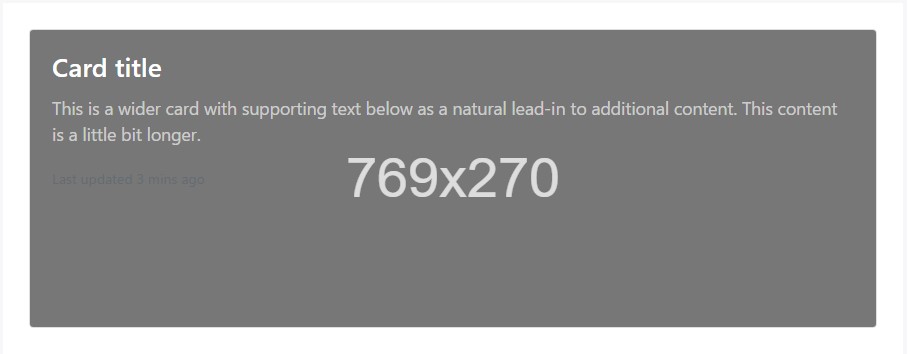
<div class="card card-inverse">
<div class="img"><img class="card-img" src="..." alt="Card image"></div>
<div class="card-img-overlay">
<h4 class="card-title">Card title</h4>
<p class="card-text">This is a wider card with supporting text below as a natural lead-in to additional content. This content is a little bit longer.</p>
<p class="card-text"><small class="text-muted">Last updated 3 mins ago</small></p>
</div>
</div>Card variations
Cards offer different choices for personalizing their backgrounds, borders, and color.
Inverted message
By default, cards use dark text and assume a light background. You can reverse that by toggling the color of text within, in addition to that of the card's subcomponents, with .card-inverse. Specify a dark background-color and border-color to go with it.
You can also use .card-inverse having the contextual backgrounds versions.

<div class="card card-inverse" style="background-color: #333; border-color: #333;">
<div class="card-block">
<h3 class="card-title">Special title treatment</h3>
<p class="card-text">With supporting text below as a natural lead-in to additional content.</p>
<a href="#" class="btn btn-primary">Go somewhere</a>
</div>
</div>Background variations
Cards include their own variant classes for rapidly changing the background-color and border-color of a card. Darker colors request the use of .card-inverse.
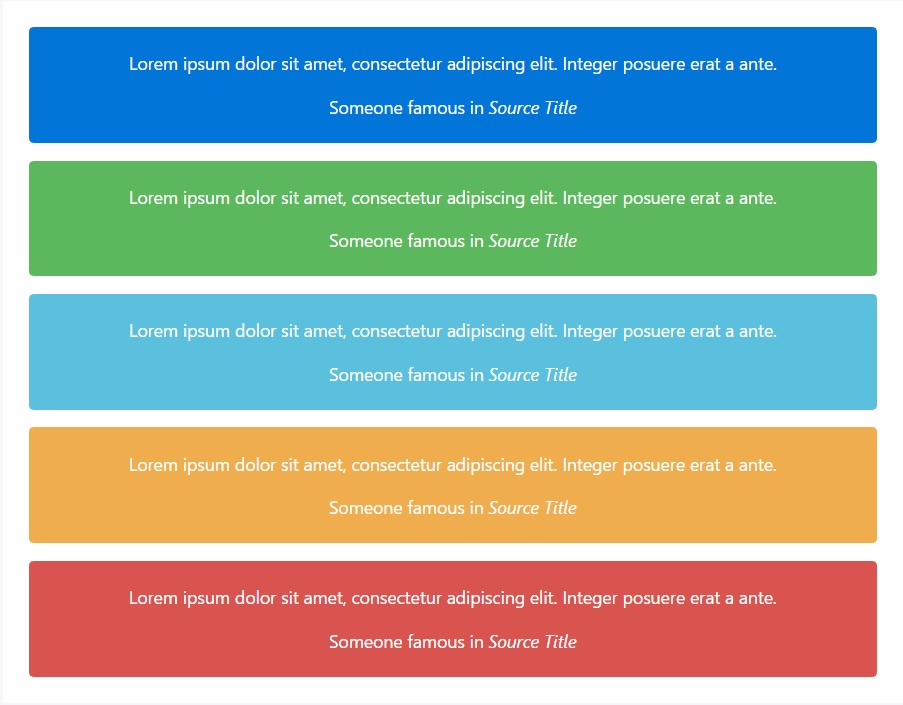
<div class="card card-inverse card-primary mb-3 text-center">
<div class="card-block">
<blockquote class="card-blockquote">
<p>Lorem ipsum dolor sit amet, consectetur adipiscing elit. Integer posuere erat a ante.</p>
<footer>Someone famous in <cite title="Source Title">Source Title</cite></footer>
</blockquote>
</div>
</div>
<div class="card card-inverse card-success mb-3 text-center">
<div class="card-block">
<blockquote class="card-blockquote">
<p>Lorem ipsum dolor sit amet, consectetur adipiscing elit. Integer posuere erat a ante.</p>
<footer>Someone famous in <cite title="Source Title">Source Title</cite></footer>
</blockquote>
</div>
</div>
<div class="card card-inverse card-info mb-3 text-center">
<div class="card-block">
<blockquote class="card-blockquote">
<p>Lorem ipsum dolor sit amet, consectetur adipiscing elit. Integer posuere erat a ante.</p>
<footer>Someone famous in <cite title="Source Title">Source Title</cite></footer>
</blockquote>
</div>
</div>
<div class="card card-inverse card-warning mb-3 text-center">
<div class="card-block">
<blockquote class="card-blockquote">
<p>Lorem ipsum dolor sit amet, consectetur adipiscing elit. Integer posuere erat a ante.</p>
<footer>Someone famous in <cite title="Source Title">Source Title</cite></footer>
</blockquote>
</div>
</div>
<div class="card card-inverse card-danger text-center">
<div class="card-block">
<blockquote class="card-blockquote">
<p>Lorem ipsum dolor sit amet, consectetur adipiscing elit. Integer posuere erat a ante.</p>
<footer>Someone famous in <cite title="Source Title">Source Title</cite></footer>
</blockquote>
</div>
</div>Showing meaning to assistive modern technologies
Utilizing color to bring in meaning only provides a visual indication, which will not be shared to users of assistive technologies-- such as screen readers. Ensure that info denoted by the color is either evident from the content itself (e.g. the visible text), or is featured through alternative means, like extra text hidden with the .sr-only class.
Outline cards
Need a colored card, but not the hefty background colors they give? Replace the default modifier classes with the .card-outline-* ones to style just the border-color of a card.

<div class="card card-outline-primary mb-3 text-center">
<div class="card-block">
<blockquote class="card-blockquote">
<p>Lorem ipsum dolor sit amet, consectetur adipiscing elit. Integer posuere erat a ante.</p>
<footer>Someone famous in <cite title="Source Title">Source Title</cite></footer>
</blockquote>
</div>
</div>
<div class="card card-outline-secondary mb-3 text-center">
<div class="card-block">
<blockquote class="card-blockquote">
<p>Lorem ipsum dolor sit amet, consectetur adipiscing elit. Integer posuere erat a ante.</p>
<footer>Someone famous in <cite title="Source Title">Source Title</cite></footer>
</blockquote>
</div>
</div>
<div class="card card-outline-success mb-3 text-center">
<div class="card-block">
<blockquote class="card-blockquote">
<p>Lorem ipsum dolor sit amet, consectetur adipiscing elit. Integer posuere erat a ante.</p>
<footer>Someone famous in <cite title="Source Title">Source Title</cite></footer>
</blockquote>
</div>
</div>
<div class="card card-outline-info mb-3 text-center">
<div class="card-block">
<blockquote class="card-blockquote">
<p>Lorem ipsum dolor sit amet, consectetur adipiscing elit. Integer posuere erat a ante.</p>
<footer>Someone famous in <cite title="Source Title">Source Title</cite></footer>
</blockquote>
</div>
</div>
<div class="card card-outline-warning mb-3 text-center">
<div class="card-block">
<blockquote class="card-blockquote">
<p>Lorem ipsum dolor sit amet, consectetur adipiscing elit. Integer posuere erat a ante.</p>
<footer>Someone famous in <cite title="Source Title">Source Title</cite></footer>
</blockquote>
</div>
</div>
<div class="card card-outline-danger text-center">
<div class="card-block">
<blockquote class="card-blockquote">
<p>Lorem ipsum dolor sit amet, consectetur adipiscing elit. Integer posuere erat a ante.</p>
<footer>Someone famous in <cite title="Source Title">Source Title</cite></footer>
</blockquote>
</div>
</div>Card arrangement
Along with styling the content within cards, Bootstrap 4 adds a number of options for laying out series of cards. For the time being, these design options are not yet responsive.
Card groups
Use card groups to make cards as a single, attached element with equal width and height columns. Card groups work with display: flex; to accomplish their uniform sizing.

<div class="card-group">
<div class="card">
<div class="img"><img class="card-img-top" src="..." alt="Card image cap"></div>
<div class="card-block">
<h4 class="card-title">Card title</h4>
<p class="card-text">This is a wider card with supporting text below as a natural lead-in to additional content. This content is a little bit longer.</p>
<p class="card-text"><small class="text-muted">Last updated 3 mins ago</small></p>
</div>
</div>
<div class="card">
<div class="img"><img class="card-img-top" src="..." alt="Card image cap"></div>
<div class="card-block">
<h4 class="card-title">Card title</h4>
<p class="card-text">This card has supporting text below as a natural lead-in to additional content.</p>
<p class="card-text"><small class="text-muted">Last updated 3 mins ago</small></p>
</div>
</div>
<div class="card">
<div class="img"><img class="card-img-top" src="..." alt="Card image cap"></div>
<div class="card-block">
<h4 class="card-title">Card title</h4>
<p class="card-text">This is a wider card with supporting text below as a natural lead-in to additional content. This card has even longer content than the first to show that equal height action.</p>
<p class="card-text"><small class="text-muted">Last updated 3 mins ago</small></p>
</div>
</div>
</div>When employing card groups with footers, their content will automatically line up.
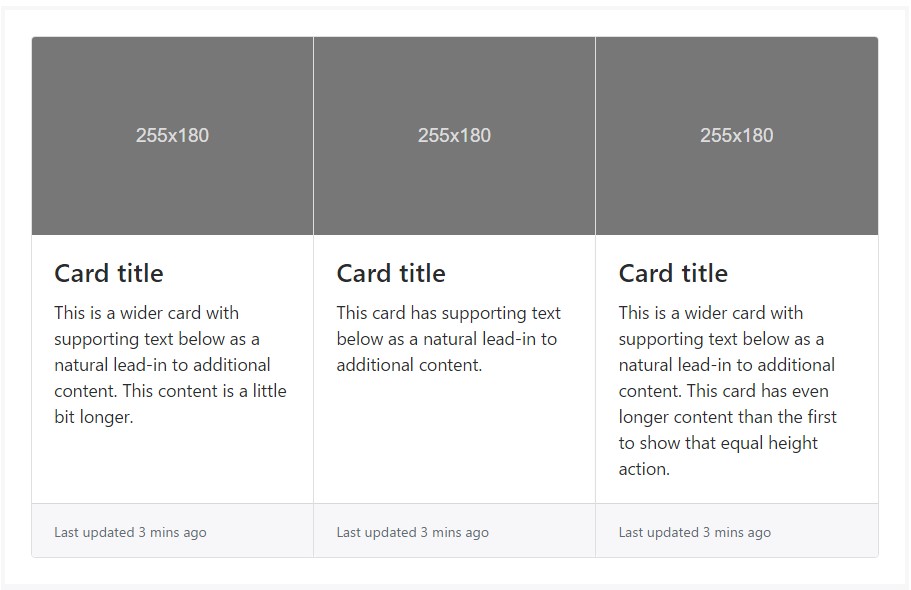
<div class="card-group">
<div class="card">
<div class="img"><img class="card-img-top" src="..." alt="Card image cap"></div>
<div class="card-block">
<h4 class="card-title">Card title</h4>
<p class="card-text">This is a wider card with supporting text below as a natural lead-in to additional content. This content is a little bit longer.</p>
</div>
<div class="card-footer">
<small class="text-muted">Last updated 3 mins ago</small>
</div>
</div>
<div class="card">
<div class="img"><img class="card-img-top" src="..." alt="Card image cap"></div>
<div class="card-block">
<h4 class="card-title">Card title</h4>
<p class="card-text">This card has supporting text below as a natural lead-in to additional content.</p>
</div>
<div class="card-footer">
<small class="text-muted">Last updated 3 mins ago</small>
</div>
</div>
<div class="card">
<div class="img"><img class="card-img-top" src="..." alt="Card image cap"></div>
<div class="card-block">
<h4 class="card-title">Card title</h4>
<p class="card-text">This is a wider card with supporting text below as a natural lead-in to additional content. This card has even longer content than the first to show that equal height action.</p>
</div>
<div class="card-footer">
<small class="text-muted">Last updated 3 mins ago</small>
</div>
</div>
</div>Card decks
Need a collection of equivalent width and also height cards that typically aren't attached to each other? Utilize card decks.

<div class="card-deck">
<div class="card">
<div class="img"><img class="card-img-top" src="..." alt="Card image cap"></div>
<div class="card-block">
<h4 class="card-title">Card title</h4>
<p class="card-text">This is a longer card with supporting text below as a natural lead-in to additional content. This content is a little bit longer.</p>
<p class="card-text"><small class="text-muted">Last updated 3 mins ago</small></p>
</div>
</div>
<div class="card">
<div class="img"><img class="card-img-top" src="..." alt="Card image cap"></div>
<div class="card-block">
<h4 class="card-title">Card title</h4>
<p class="card-text">This card has supporting text below as a natural lead-in to additional content.</p>
<p class="card-text"><small class="text-muted">Last updated 3 mins ago</small></p>
</div>
</div>
<div class="card">
<div class="img"><img class="card-img-top" src="..." alt="Card image cap"></div>
<div class="card-block">
<h4 class="card-title">Card title</h4>
<p class="card-text">This is a wider card with supporting text below as a natural lead-in to additional content. This card has even longer content than the first to show that equal height action.</p>
<p class="card-text"><small class="text-muted">Last updated 3 mins ago</small></p>
</div>
</div>
</div>Just like with card groups, card footers in decks will automatically line up.
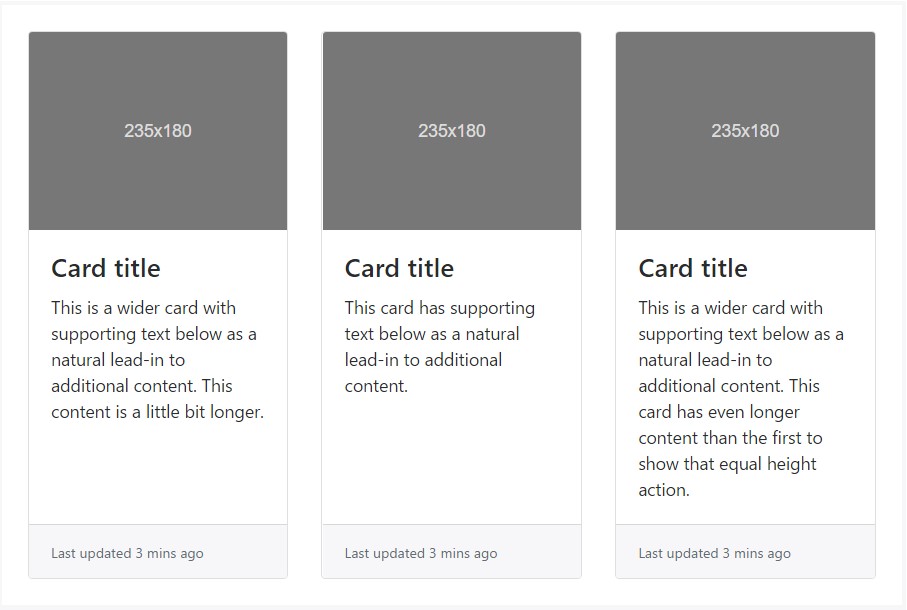
<div class="card-deck">
<div class="card">
<div class="img"><img class="card-img-top" src="..." alt="Card image cap"></div>
<div class="card-block">
<h4 class="card-title">Card title</h4>
<p class="card-text">This is a wider card with supporting text below as a natural lead-in to additional content. This content is a little bit longer.</p>
</div>
<div class="card-footer">
<small class="text-muted">Last updated 3 mins ago</small>
</div>
</div>
<div class="card">
<div class="img"><img class="card-img-top" src="..." alt="Card image cap"></div>
<div class="card-block">
<h4 class="card-title">Card title</h4>
<p class="card-text">This card has supporting text below as a natural lead-in to additional content.</p>
</div>
<div class="card-footer">
<small class="text-muted">Last updated 3 mins ago</small>
</div>
</div>
<div class="card">
<div class="img"><img class="card-img-top" src="..." alt="Card image cap"></div>
<div class="card-block">
<h4 class="card-title">Card title</h4>
<p class="card-text">This is a wider card with supporting text below as a natural lead-in to additional content. This card has even longer content than the first to show that equal height action.</p>
</div>
<div class="card-footer">
<small class="text-muted">Last updated 3 mins ago</small>
</div>
</div>
</div>Card columns
Cards may be arranged into Masonry-like columns with just CSS by putting them in .card-columns. Cards are created with CSS column properties instead of flexbox for simpler alignment. Cards are ordered from top to bottom and left to.
Heads up! Your mileage with card columns may differ. To prevent cards breaking across columns, set them to display: inline-block as column-break-inside: avoid isn't a bulletproof solution yet.
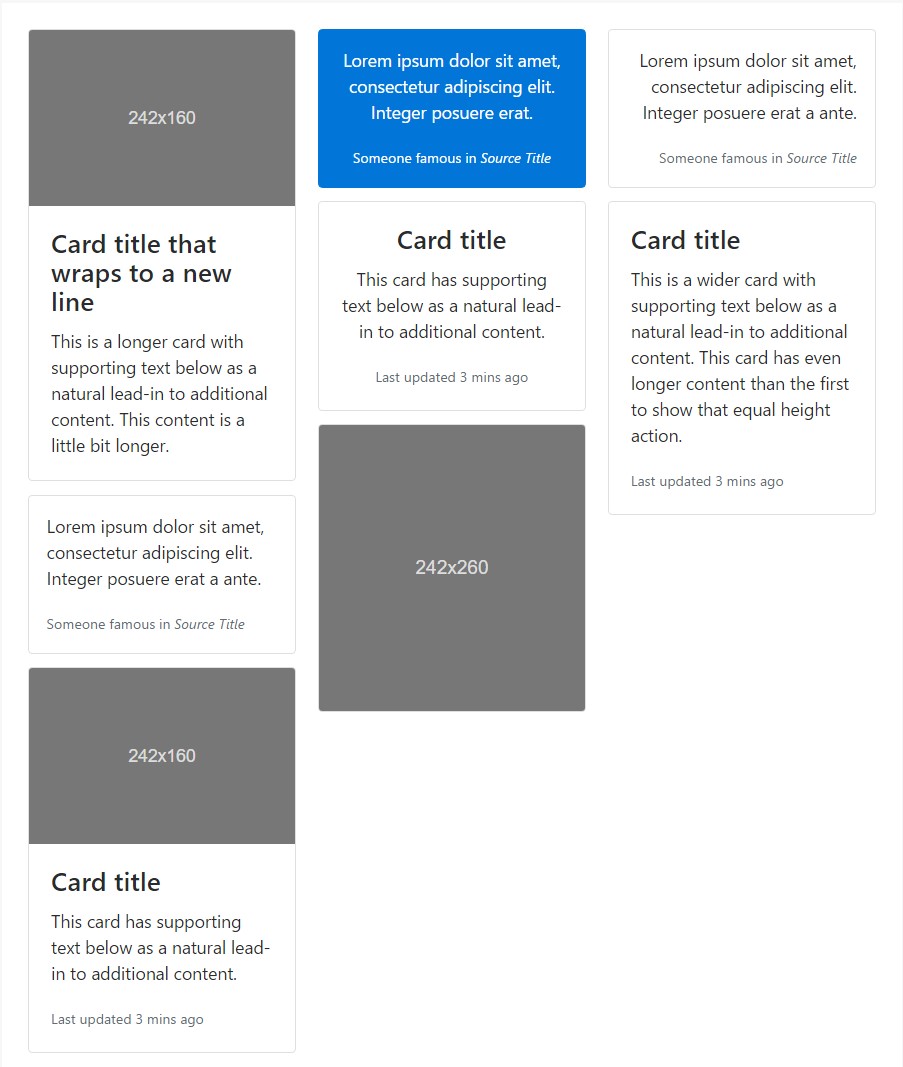
<div class="card-columns">
<div class="card">
<div class="img"><img class="card-img-top img-fluid" src="..." alt="Card image cap"></div>
<div class="card-block">
<h4 class="card-title">Card title that wraps to a new line</h4>
<p class="card-text">This is a longer card with supporting text below as a natural lead-in to additional content. This content is a little bit longer.</p>
</div>
</div>
<div class="card p-3">
<blockquote class="card-block card-blockquote">
<p>Lorem ipsum dolor sit amet, consectetur adipiscing elit. Integer posuere erat a ante.</p>
<footer>
<small class="text-muted">
Someone famous in <cite title="Source Title">Source Title</cite>
</small>
</footer>
</blockquote>
</div>
<div class="card">
<div class="img"><img class="card-img-top img-fluid" src="..." alt="Card image cap"></div>
<div class="card-block">
<h4 class="card-title">Card title</h4>
<p class="card-text">This card has supporting text below as a natural lead-in to additional content.</p>
<p class="card-text"><small class="text-muted">Last updated 3 mins ago</small></p>
</div>
</div>
<div class="card card-inverse card-primary p-3 text-center">
<blockquote class="card-blockquote">
<p>Lorem ipsum dolor sit amet, consectetur adipiscing elit. Integer posuere erat.</p>
<footer>
<small>
Someone famous in <cite title="Source Title">Source Title</cite>
</small>
</footer>
</blockquote>
</div>
<div class="card text-center">
<div class="card-block">
<h4 class="card-title">Card title</h4>
<p class="card-text">This card has supporting text below as a natural lead-in to additional content.</p>
<p class="card-text"><small class="text-muted">Last updated 3 mins ago</small></p>
</div>
</div>
<div class="card">
<div class="img"><img class="card-img img-fluid" src="..." alt="Card image"></div>
</div>
<div class="card p-3 text-right">
<blockquote class="card-blockquote">
<p>Lorem ipsum dolor sit amet, consectetur adipiscing elit. Integer posuere erat a ante.</p>
<footer>
<small class="text-muted">
Someone famous in <cite title="Source Title">Source Title</cite>
</small>
</footer>
</blockquote>
</div>
<div class="card">
<div class="card-block">
<h4 class="card-title">Card title</h4>
<p class="card-text">This is a wider card with supporting text below as a natural lead-in to additional content. This card has even longer content than the first to show that equal height action.</p>
<p class="card-text"><small class="text-muted">Last updated 3 mins ago</small></p>
</div>
</div>
</div>Card columns can also be expanded and also customized with some extra code. Shown below is an expansion of the .card-columns class making use of the same CSS-- CSS columns-- to create a collection of responsive rates for transforming the variety of columns.
.card-columns
@include media-breakpoint-only(lg)
column-count: 4;
@include media-breakpoint-only(xl)
column-count: 5;Final thoughts
Actually this is the method the new to Bootstrap 4 card element becomes easily set up. As always aiming for easiness and simplicity the new framework version integrates the functionality of multiple sections into a singular and effective one. Right now you should pick up the features you need to be included in some cards.
Inspect some youtube video short training regarding Bootstrap Panel Body:
Connected topics:
Bootstrap Panel-Cards: authoritative information
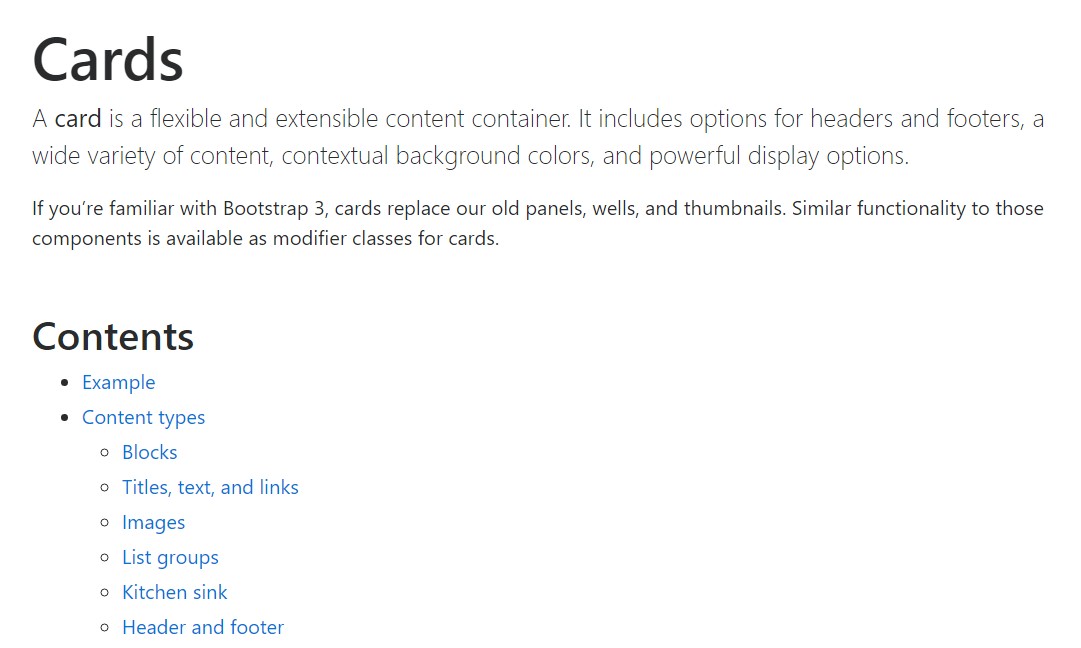
Insights on exactly how can we form Bootstrap 4 cards just the same height?
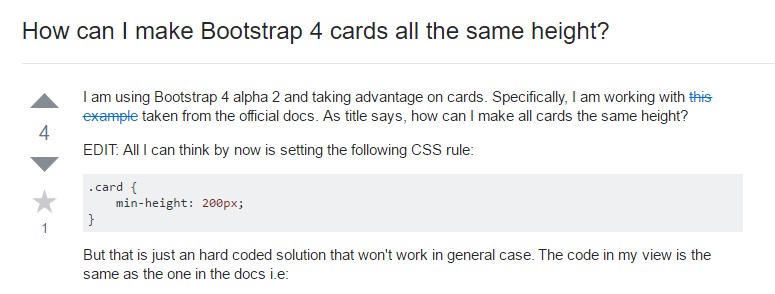
Wanting past panel look for cards
